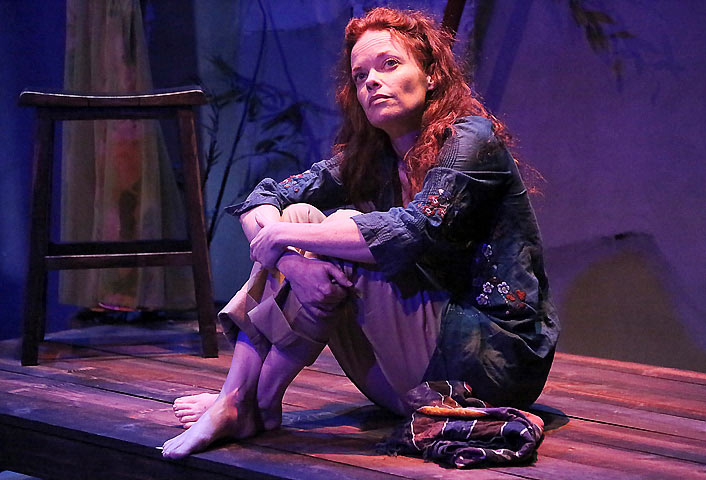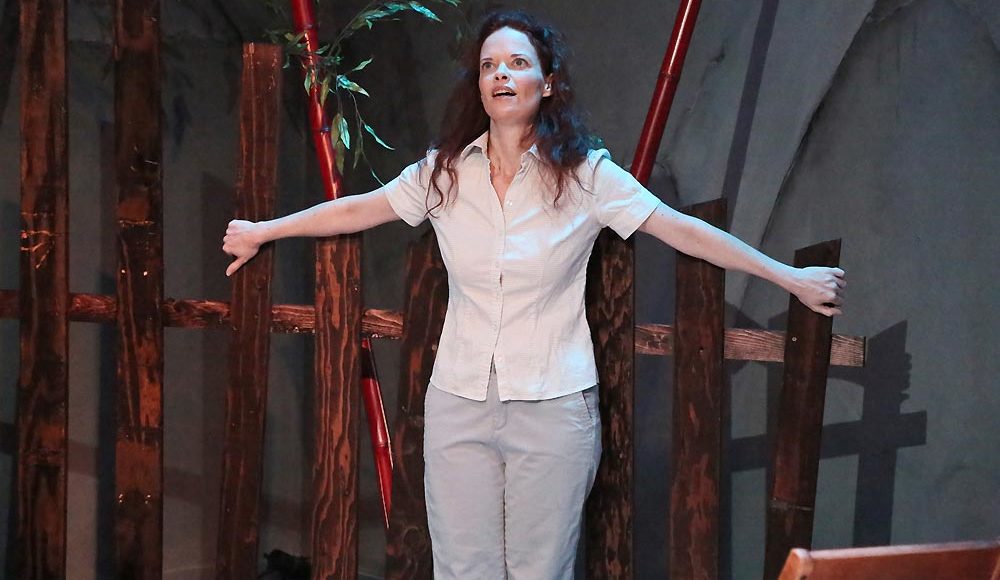A one-woman-show on Barack Obama’s mother…. Hmmmmmmm…..
The subject is always a problem when it comes to the one-man or one-woman show.
If the character is a literary figure, the danger is having your undertaking overwhelmed by his or her own writings. This is especially a threat when the writer or performer of the show is a devotee of the personality featured in the piece.
Hence the explanation why one-man shows about Edgar Allan Poe often find themselves defeated as dramas, by their fall into realm of recitals.
If, on the other hand, the subject of your one-man or one-woman show puts it in the genre of historical narrative, then another problem comes to the forefront, the risk of encumbering your piece with the dryness of a bad history lecture.
Finally, if the central subject is neither a literary persona nor a historical figure, a third, and perhaps greater hazard is placed before the writer/performer: Why should anyone give a damn about them?
In some fashion Stanley Ann by Mike Kindle was confronted by all these perils, so that the odds against his success were about equal to those of the Alamo defenders facing the vast army of Santa Ana.
However, in this instance, the writing reinforced the Alamo’s walls with platinum plating. In the show’s director, the defense of the Alamo was assigned to George Patton who issued Kalashnikovs to those defending it; and by having Ann Noble in the title role, suddenly Davy Crockett was granted unlimited access to call in drone strikes, thus making hamburger of Santa Ana’s army and sparing the world a really awful John Wayne movie.
(Egads! It occurs to me, with the exception of Ann Noble, I’ve suffered through one-man shows based on everyone named in the above paragraph! But returning to the review at hand… )
Stanley Ann comprises an intriguing mixture of divergent ingredients: chutzpa, shrewdness, originality and good ol’ American commercial exploitation. But like Frank, legendary bartender at Hollywood’s Alpine Bar, Kindle skillfully blends this odd concoction into a true pallet pleaser.
Let’s start with originality.
Other than a historical bio of Letizia Ramolino, the matriarch of the Bonaparte clan, I was forced to endure years ago, I cannot call to mind any other one-woman show where the focus was the mother of a historical figure.
Kindle begins the story of Ann Durham as a young, rather flighty girl full of great dreams and in love with the Kenyon student who she would soon marry and be pregnant by. From then on Kindle succeeds in showing the development of this girl as she is exposed to the world of real politics.
That exposure begins with her moving to Jakarta with her young son Barry to join her second husband in 1967.
If there’s any flaw with Kindle’s work, it is in his not fully presenting this period in Indonesian history to the audience.
In 1965, the murder of a number of Indonesian generals, the overthrow of President Sukarno’s government, and the dictatorship of Suharto, were all brought about by events that are still shrouded in mystery and disinformation.
This was followed by the nationwide mass murder and imprisonment of anyone connected with the Indonesian Communist Party, the PKI. For five months the killing spread to their families, the country’s intellectuals, and the ethnic Chinese.
The number of deaths is difficult to measure. Conservative estimations fluctuate at between 200,000 to 600,000 dead, but some put it as high as two million.
Joshua Oppenheimer’s 2012 documentary, The Act of Killing, (produced by Signe Byrge Sørensen, executive produced by Errol Morris and Werner Herzog) examines this period and interviews the men recruited by the Suharto regime to act as death squads.
Oppenheimer’s Indonesian co-director as well as 48 other crew members on the film are credited as “Anonymous” due to fear of government reprisals.
This was the environment Ann Dunham and her six-year-old son found themselves in.
In his memoir, Dreams From My Father Obama would write, “Innuendo, half-whispered asides, that’s how my mother found out that we had arrived in Jakarta less than a year after one of the most brutal and swift campaigns of suppression in modern times.”

Kindle tells the story of Ann Dunham in a succession of elegantly brief scenes that unfold like a series of haikus, taking us from a young girl on a beach looking dreamily up at the moon, to a woman, with a doctorate in anthropology, fluent in Bahasa, with a working knowledge of Hindi, Javanese, French and Latin, campaigning for a bank offering economic freedom via loans to third world women.
Like all idealists she had come to learn she could not save the world.
But that hadn’t stopped her from trying to save pieces of it.
From his program bio, Kindle reveals himself as a skilled and intelligent writer. But a production as good as this does not a good play alone make.
Jon Imparato, the producer behind 2014’s peerless staging of Edward Albee’s The Goat or, Who is Sylvia?, adds another feather to his all ready impressive bonnet here.
Also credited on the producing team are Victoria Mudd and Elizabeth Yng-Wong, both who have experience with the Pacific region and Hawaii and must have contributed to the stunning authenticity captured by Robert Selander’s beautiful set, Matt Richter’s light design and Christopher Moscartiello’s sound score.
Mark Bringelson shows his chops as a director by deftly avoiding the numerous pit falls a lesser director could have tumbled down into.
He never allows the action of the piece to flag, or for the audience to be subjected to a plague of “blackout-i-tiss.”
He hasn’t blocked the staging as much as choreographed it, and that, to beautiful effect.
But even the best play and director and sets and lights will run afoul if the central pillar is unable to bear the pressure of the show.
In Ann Noble there is no fear of this.
Those of us who saw her in The Goat or, Who is Sylvia? are still trying to lift our jaws back up from the floor.
As Stanley Ann, named so by a father who wanted a son, Ms. Noble captures us from the first moment she appears, and even at her curtain bow, we didn’t want to be let go.
Stanley Ann Dunham died on Nov. 7, 1995, weeks before her 53rd birthday, and a year before her son was elected to the Illinois State Senate.
There are many good reasons to see this production, unless you’re one of the lunatic fringe still insisting Barack Obama’s birth certificate was a forgery, and that his election would usher in two thousand years of chaos and slaughter. †
You should see it because it is a superb staging from top to bottom, and the insight into the history and the times that went into making the man Barack Obama would become, are fascinating. ††
But it is Ann Noble’s performance that raises this show to the level of “Not-to-be-missed,” and her perfect portrayal of a girl who grows into womanhood, and learns that dreams aren’t realized by the hopes we hold, but by the seeds we plant.
The World Premiere of
STANLEY ANN: THE UNLIKELY STORY OF BARACK OBAMA’S MOTHER
Written by MIKE KINDLE
Directed by Mark Bringelson
Performed by Ann Noble
At: The Los Angeles LGBT Center
Davidson/Valentini Theatre
Where: The Village At Ed Gould Plaza
1125 N. McCadden Place
Hollywood 90028
When: Now through JULY 26, 2015
Thursday/Friday/Saturday AT 8PM
Sunday AT 7PM
Tickets: www.lalgbtcenter.org/theatre
Or Call 323-860-7300 or 323-860-7300
All seats $20
♦ ♦ ♦
† Could somebody please ask Chuck Norris what ever happened to that?
†† Though I feel some deeper digging into the family ancestry would have been interesting. Perhaps back to Obama’s great-great-great-grandfather who emigrated from Ireland in 1850; Falmouth Kearney. Give a call cousin Barack.





